For the 2025 school year, there are 2 public elementary schools serving 427 students in Ford Heights SD 169 School District. This district's average elementary testing ranking is 1/10, which is in the bottom 50% of public elementary schools in Illinois.
Public Elementary Schools in Ford Heights SD 169 School District have an average math proficiency score of 5% (versus the Illinois public elementary school average of 26%), and reading proficiency score of 9% (versus the 30% statewide average).
Minority enrollment is 100% of the student body (majority Black), which is more than the Illinois public elementary school average of 56% (majority Hispanic).
Overview
This School District
This State (IL)
# Schools
2 Schools
3,104 Schools
# Students
427 Students
1,223,907 Students
# Teachers
27 Teachers
89,922 Teachers
Student : Teacher Ratio
16:1
16:1
District Rank
Ford Heights SD 169 School District, which is ranked within the bottom 50% of all 844 school districts in Illinois (based off of combined math and reading proficiency testing data) for the 2020-2021 school year.
Overall District Rank
#846 out of 852 school districts
(Bottom 50%)
(Bottom 50%)
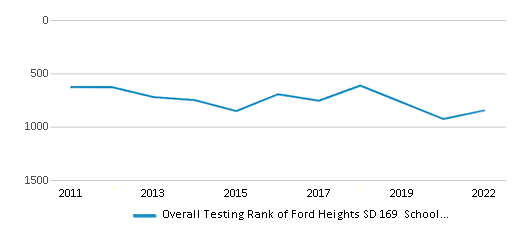
Math Test Scores (% Proficient)
(20-21)≤1%
28%
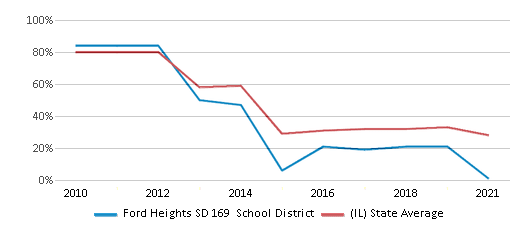
Reading/Language Arts Test Scores (% Proficient)
8%
30%

Science Test Scores (% Proficient)
10-14%
50%
Students by Ethnicity:
Diversity Score
0.09
0.71
# American Indian Students
n/a
2,875 Students
% American Indian Students
n/a
1%
# Asian Students
n/a
66,874 Students
% Asian Students
n/a
6%
# Hispanic Students
21 Students
327,522 Students
% Hispanic Students
5%
27%
# Black Students
406 Students
200,526 Students
% Black Students
95%
17%
# White Students
n/a
537,078 Students
% White Students
n/a
44%
# Hawaiian Students
n/a
1,010 Students
% Hawaiian Students
n/a
n/a
# Two or more races Students
n/a
52,605 Students
% of Two or more races Students
n/a
5%
Students by Grade:
# Students in PK Grade:
65
55,955
# Students in K Grade:
53
116,411
# Students in 1st Grade:
47
126,375
# Students in 2nd Grade:
46
167,370
# Students in 3rd Grade:
32
130,315
# Students in 4th Grade:
44
130,334
# Students in 5th Grade:
41
129,913
# Students in 6th Grade:
34
132,181
# Students in 7th Grade:
32
113,007
# Students in 8th Grade:
33
113,824
# Students in 9th Grade:
-
2,377
# Students in 10th Grade:
-
2,138
# Students in 11th Grade:
-
1,882
# Students in 12th Grade:
-
1,813
# Ungraded Students:
-
12
District Revenue and Spending
The revenue/student of $33,930 is higher than the state median of $21,990. The school district revenue/student has stayed relatively flat over four school years.
The school district's spending/student of $28,963 is higher than the state median of $21,244. The school district spending/student has stayed relatively flat over four school years.
Total Revenue
$15 MM
$41,381 MM
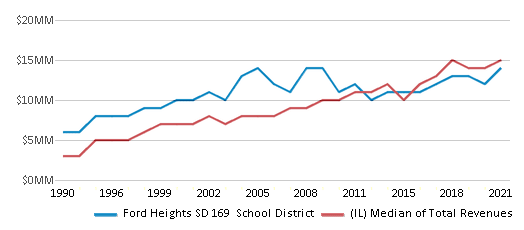
Spending
$12 MM
$39,976 MM

Revenue / Student
$33,930
$21,990
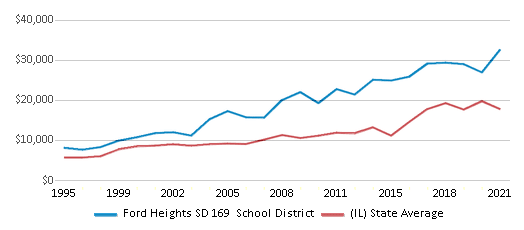
Spending / Student
$28,963
$21,244
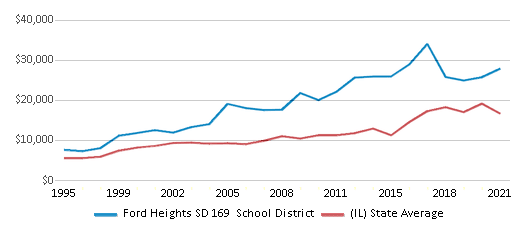
Best Ford Heights SD 169 School District Public Elementary Schools (2025)
School
(Math and Reading Proficiency)
(Math and Reading Proficiency)
Location
Grades
Students
Rank: #11.
Medgar Evers Primary Acadmc Center
Rank:
2/
Bottom 50%10
1101 E 10th St
Chicago Heights, IL 60411
(708) 758-2520
Chicago Heights, IL 60411
(708) 758-2520
Grades: PK-4
| 288 students
Rank: #22.
Cottage Grove Upper Grade Center
Rank:
1/
Bottom 50%10
800 E 14th St
Chicago Heights, IL 60411
(708) 758-1400
Chicago Heights, IL 60411
(708) 758-1400
Grades: 5-8
| 139 students
Recent Articles

Year-Round Or Traditional Schedule?
Which is more appropriate for your child? A year-round attendance schedule or traditional schedule? We look at the pros and cons.

Why You Should Encourage Your Child to Join a Sports Team
Participating in team sports has a great many benefits for children, there is no doubt. In this article you will learn what those benefits are.

White Students are Now the Minority in U.S. Public Schools
Increasing birth rates among immigrant families from Asia and Central and South America, combined with lower birth rates among white families, means that for the first time in history, public school students in the United States are majority-minority. This shift in demographics poses difficulties for schools as they work to accommodate children of varying language abilities and socio-economic backgrounds.





